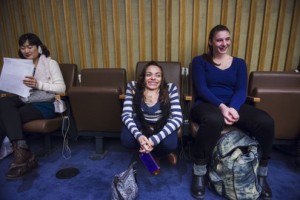
We participants gathered at the UNDESA Forum on Disability Inclusion and Accessible Urban Development, which was co-organized by the Department of Economic and Social Affairs and UN Habitat in Nairobi from 28 to 30 October 2015, and in conjunction with the 2nd World Cities Day themed “Designed to Live Together”, have reviewed the situations, experiences and solutions for persons with disabilities in cities and countries in Africa, the Americas, Asia and Pacific, Europe and Western Asia,
We found with concern that the estimated one billion persons with disabilities experience various physical, technical or institutional barriers in many cities and towns, ranging from inaccessible built and virtual infrastructures and resources, to a lack of user-sensitive facilities or limited access to basic public services, which present significant obstacles to inclusion and full and effective participation of persons with disabilities, and impede achievement of sustainable and inclusive development,
We further noted that international norms and standards such as the United Nations Convention on the Rights of Persons with Disabilities and national legislation and policies play important roles in contributing to accessibility in built and virtual environments, facilities and services, including information and communication technologies (ICTs), which benefit all, including persons with disabilities,
We are encouraged that the 2030 Agenda for Sustainable Development addresses accessibility and inclusion of persons with disabilities in Goal 11 (Make cities and human settlements inclusive, safe, resilient and sustainable) in particular,
We recognize that Habitat III and its outcome, the New Urban Agenda, would offer an important opportunity to further advance sustainable and inclusive urban development for all,
We are encouraged by the increasing number of initiatives, experiences and lessons learnt from good practices in countries, promoting accessible and inclusive development for all.
Recommendations
We, therefore, propose the following as our contributions to the on-going consultations on the New Urban Agenda to further accessible and inclusive urban development:
- Accessibility is a collective good that benefits all. It facilitates full and effective participation of all and should therefore be considered a central component of good policy to achieve inclusive and sustainable urban development. A city that is well designed is well designed for all.
- Accessibility is a precondition for the enjoyment of human rights of persons with disabilities and is a means for economic, social, cultural and political empowerment, participation and inclusion.
- An accessible and disability-inclusive urban development agenda can be realised everywhere. This requires strong commitments in concrete terms, which include inclusive and disability-responsive urban policy frameworks, appropriate regulatory structures and standards, "design for all" approaches in planning and design, and predictable resource allocations. It also requires active and meaningful participation of persons with disabilities and their organisations, as rights-holders and as agents and beneficiaries of development during all stages of the urbanization process.
- Accessibility is broadly understood as products, services, built environments and information communication technologies that respond to the interests, needs and capabilities of a wide range of end users, persons with disabilities in particular.
- The Sustainable Development Goals message to “leave no one behind” seeks to ensure that the targets are met for all peoples and segments of society, including persons with disabilities in cities.
- Achievement of a truly inclusive New Urban Agenda, where no one is left behind, requires a holistic and people-centred approach that informs, engages, and involves persons with disabilities and their organizations in all aspects of urban development, in particular in their access to adequate housing.
- The New Urban Agenda should further advancement of accessibility for all with respect to the right to adequate housing, the built environment, public spaces, transportation, facilities and services and information and communication technologies (ICTs).
- A New Urban Agenda cannot be achieved unless it responds to the needs and rights of everyone, including the estimated one billion people with disabilities.
I. Housing as a key element of inclusive cities
- Integrated approaches to housing, positioning housing at the centre of inclusive urban development, need to take account not only of environmental sustainability, diversity (including disability) and financial aspects, but also human rights.
- Universal design, as a concept and principle, should be reflected in designs and plans for new built environments and in renovations to existing buildings and facilities to ensure they are accessible for all.
- Building standards, laws and effective enforcement mechanisms are essential to ensure accessibility, availability, affordability and quality of housing and public services for all, including persons with disabilities.
II. Transportation and public services
- Integrated transportation facilities and services not only provide accessibility for all but are also reliable and affordable. They drive sustainable and inclusive growth and change.
- Inclusive transportation requires continuity of accessibility throughout travel chains, meaning all elements of a journey from the starting point to the final destination include accessible entranceways.
- Integrated urban policy and plans must identify and address gaps in accessibility in public spaces and from one built environment to another.
- Social equity requires that the costs of accessible transportation and basic public services shall not be borne fully by users who require services since these are essential to ensure opportunities for full and effective participation in social, economic, cultural and political life for persons with disabilities.
III. Information and communication technologies (ICTs) for building inclusive, resilient smart cities
- Governments should develop accessible information and communication technologies (ICTs), including mobile applications, government websites, public kiosks and automated teller machines, and should include the use of accessible ICT services in their urban development plans.
- The rapid pace of development and innovation in ICT products and services means that assistive and adaptive devises and technologies are not always compatible and the cost of many such technologies limits access for persons with disabilities, particularly in low-income and middle-income countries. Governments should promote and facilitate research, development and mainstreaming of accessible ICT products and services by including accessibility requirements in public procurement exercises for ICT products and services used by public organisations or their customers or staff.
- Many national telecommunication authorities have universal service goals which recognize affordability and access to networks as a right; consideration shall be accorded urgently to accessibility as a third universal service goal.
We appreciate the initiative of the Department of Economic and Social Affairs (UNDESA) and UN Habitat for convening this long-awaited global consultation on inclusive, accessible and sustainable urban development and recommend that the work of the United Nations in this area should be further strengthened, including through follow-ups to this forum, to support Member States and other stakeholders for an inclusive New Urban Agenda.
DESA Forum on Disability Inclusion and Accessible Urban Development, Nairobi
30 October 2015
***
Note:
On the occasion of the World Cities Day themed “Designed to Live Together” from 28 to 30 Oct 2015, a 3-day DESA Forum on Disability Inclusion and Accessible Urban Development was co-organized by DESA and UN Habitat in close collaboration with the African Union Commission and the African Disability Forum as well as experts on urban planning and disability issues from 30 countries of five continents in the world. The following is one of the major results achieved at the Forum with a view to providing a specific contribution to the Habitat III processes and its envisaged outcome and to support Member States and other major stakeholders to achieve an inclusive New Urban Agenda for all. DESA Forum on Disability and Development, officially launched in July 2013, is an initiative of Division for Social Policy and Development of the Department of Economic and Social Affairs of the United Nations (DESA), which aims to contribute to inclusive, equitable and sustainable development and efforts, through the exchange of experiences, expertise and innovative ideas and development of practical solutions for pressing issues with regard to disability in development and society. More background information about the DESA Forum is available at the UN ENABLE website www.un.org/disabilities.
 Welcome to the United Nations
Welcome to the United Nations
